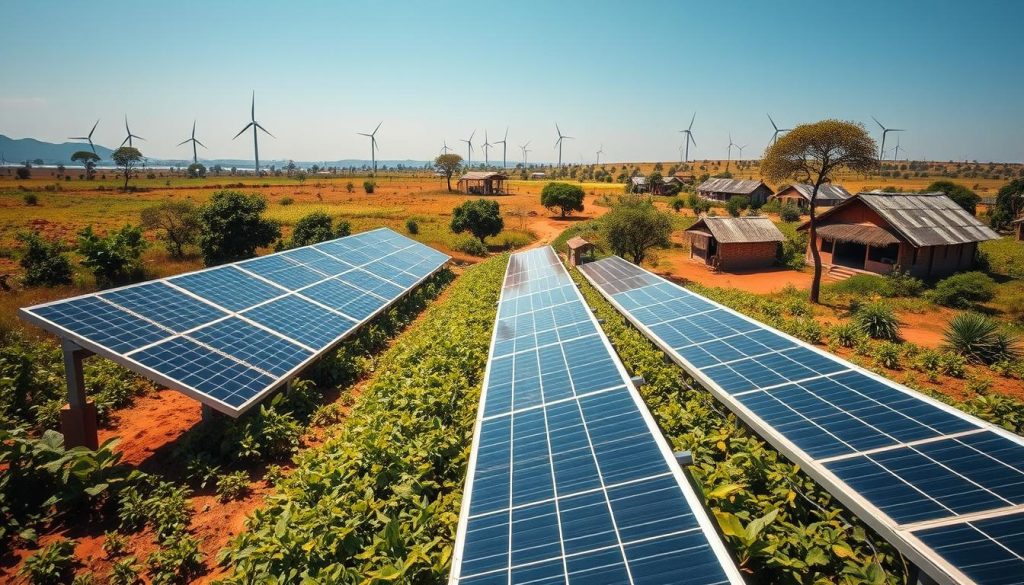Africa is becoming a key player in the global push for sustainability. It offers many chances for businesses that focus on the environment. These green ventures help the economy grow and tackle big environmental problems.
In countries like Kenya and South Africa, we see how green investments can change local economies. They also help make our planet healthier.
The Importance of Green Ventures in Africa
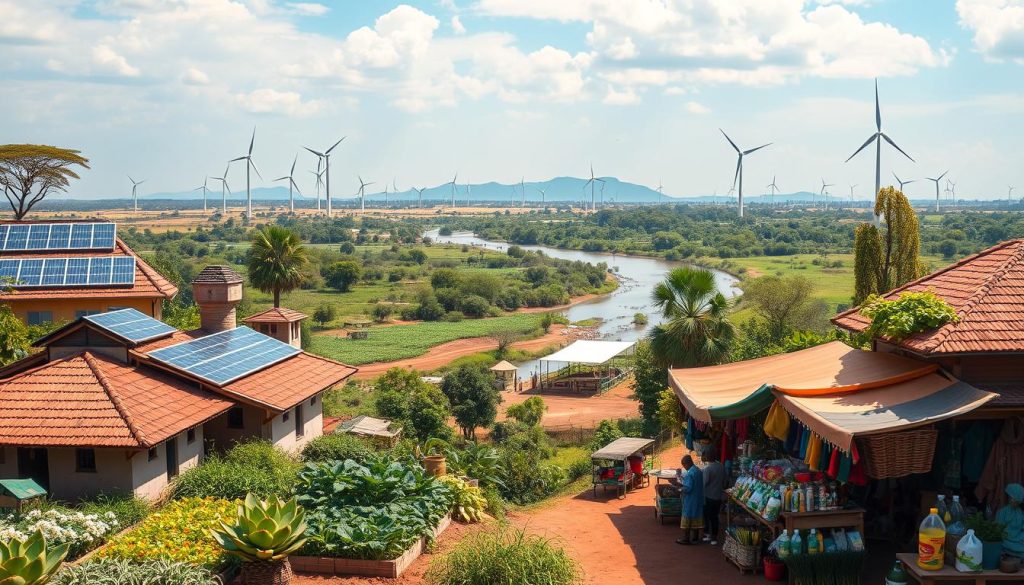
Green ventures in Africa are very important. They help solve big environmental problems like climate change and deforestation. These efforts protect natural resources, which are key for local communities’ survival.
Businesses that focus on sustainability are key to success in the new sustainable economy. It’s clear that the health of our planet and economic growth go hand in hand. The African Development Bank’s research shows green investments can bring big economic benefits and help communities face environmental challenges.
- Green ventures support local communities by creating job opportunities.
- They help mitigate climate risks through sustainable practices.
- Long-term economic growth can be achieved through a focus on environmental stewardship.
The success of these businesses depends on their commitment to sustainability. Supporting these efforts helps communities and promotes balanced development. Green ventures are more than just making money; they are crucial for Africa’s sustainable future.
Understanding Eco-friendly Business Opportunities in Africa
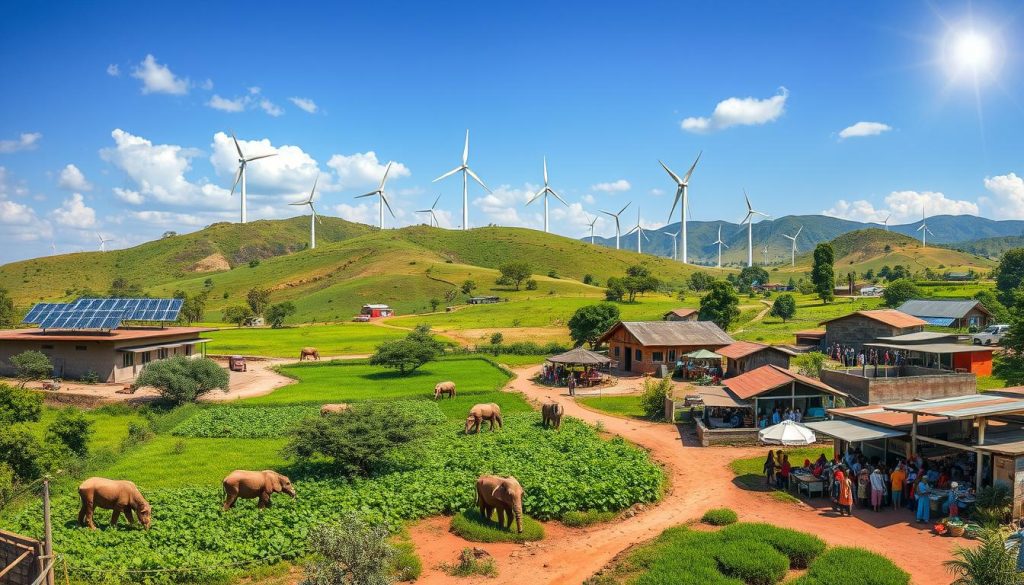
Eco-friendly opportunities in Africa are growing fast. This is because more people are aware of the need for sustainable practices. The continent is seeing a rise in businesses that are good for the planet and meet market needs.
Studies show big changes in African market trends. These changes are in areas like sustainable farming, renewable energy, and better waste management. This is a big step towards a greener future.
More and more people in Africa want products and services that are good for the environment. As cities grow, businesses are focusing on being sustainable. Companies that care about the planet often get ahead because they appeal to customers who value ethics.
Experts, like the World Bank, see great potential in eco-friendly businesses in Africa. By meeting the demand for green solutions, entrepreneurs and investors can change the economy. This not only brings in money but also helps protect the environment.
Sustainable Agriculture Practices
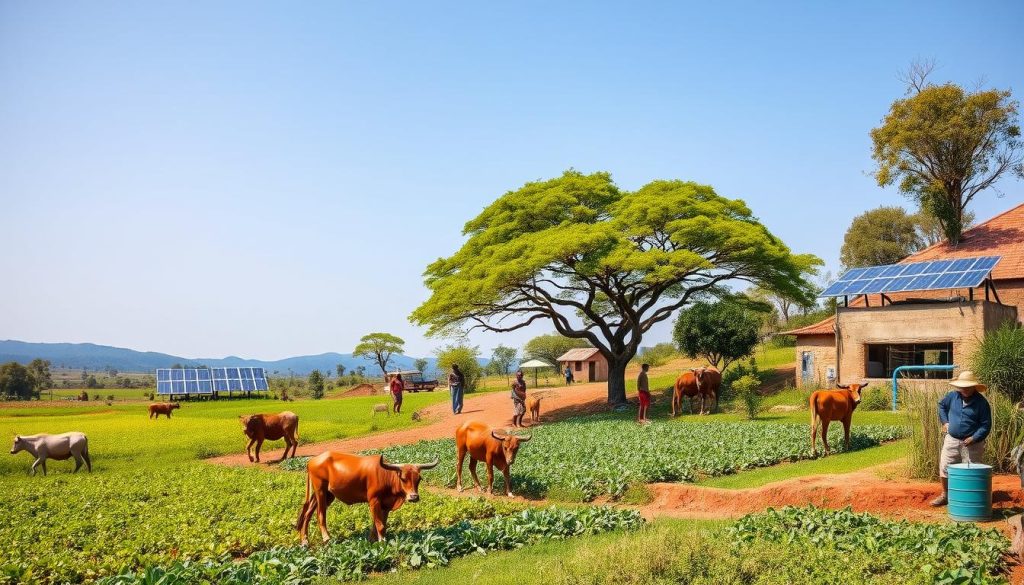
Sustainable agriculture is key to a strong food system in Africa. It uses methods that are good for the environment and help crops grow better. Organic farming and agroforestry are leading the way, making farming better for the planet and for farmers’ pockets.
Organic Farming Techniques
Organic farming is becoming more popular. It focuses on using nature’s ways to grow food. Some main practices are:
- Using natural pesticides to keep pests away without harming nature.
- Rotating crops to make soil richer and stop pests.
- Planting cover crops to stop soil from washing away and keep it moist.
These methods help farming be more sustainable. They cut down on harmful chemicals and boost the variety of life in farms.
Agroforestry Innovations
Agroforestry is a big change in farming that mixes trees with crops. It brings many benefits to farmers:
- Soil gets better because of the trees’ organic matter.
- Farms are more ready for weather changes.
- More life exists in the farm, helping other animals and plants.
New ideas in agroforestry are showing great results. They help crops grow better and protect the environment. This shows how vital sustainable farming is for the area.
Renewable Energy Solutions
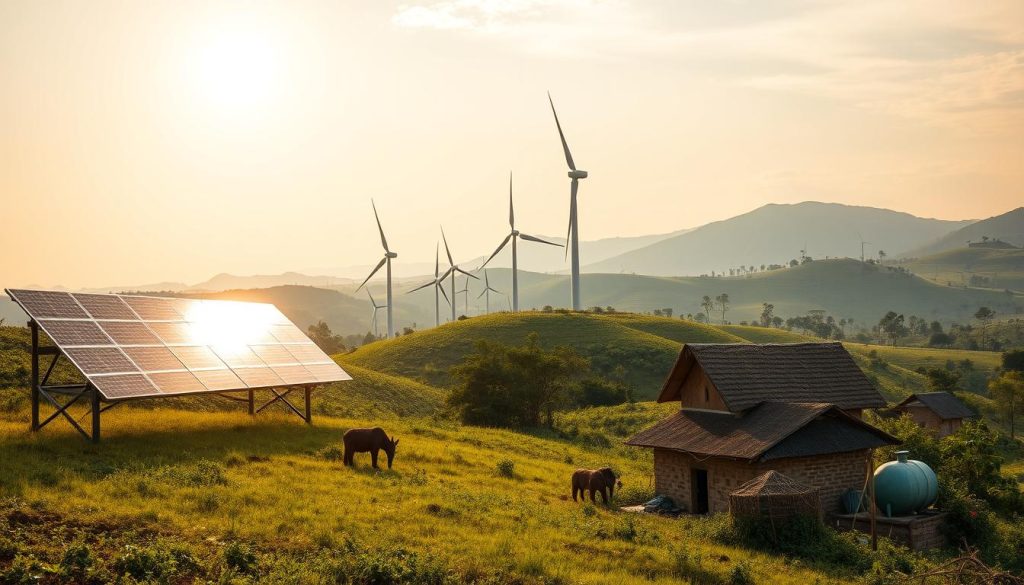
Africa’s energy needs are growing fast. Solar power and wind energy are becoming key alternatives to fossil fuels. They offer big environmental and economic benefits, and improve energy security for the continent.
Solar Power Benefits
Solar power is leading the way in renewable energy. It brings many advantages to African countries:
- Cost Reduction: Solar tech prices are falling, making energy more affordable.
- Energy Independence: It cuts down on the need for imported fuels, boosting self-sufficiency.
- Job Creation: The solar sector creates jobs at all skill levels.
Morocco shows how successful solar projects can be. The Noor Solar Complex is a big contributor to the national grid.
Wind Energy Projects
Wind energy is also crucial in Africa’s renewable energy mix. Projects across the continent show its potential:
- Reliability: Wind farms provide steady energy in good locations.
- Environmental Impact: They produce clean energy, unlike fossil fuels.
- Investment Opportunities: The growing wind energy sector draws investments from home and abroad.
South Africa’s Khobab Wind Farm is a success story. It proves wind energy can make energy systems more sustainable.
Waste Management and Recycling Initiatives
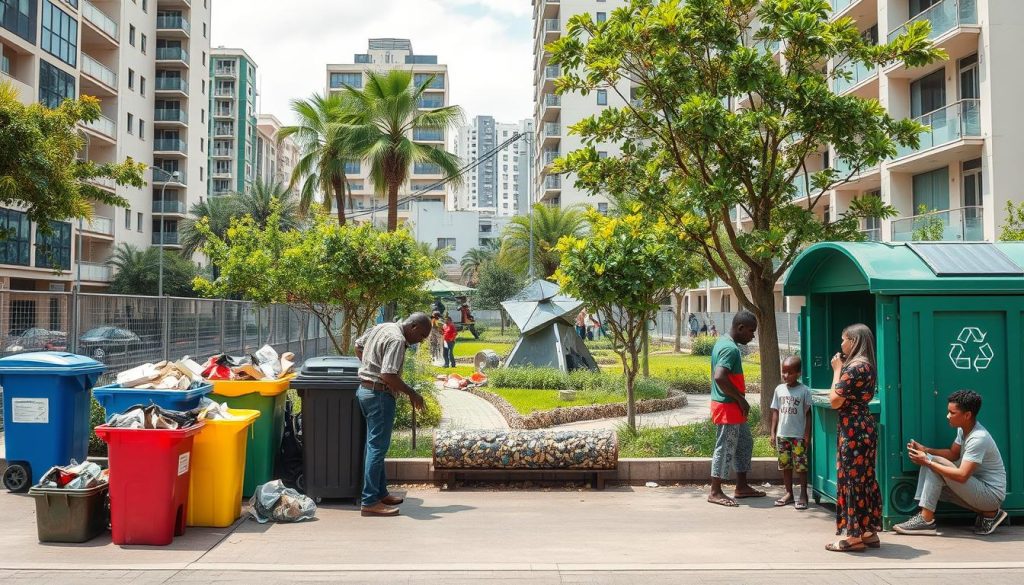
Effective waste management is key to keeping our environment healthy and promoting green practices. In Africa, many communities have started recycling projects. These aim to cut down waste and bring in money. They also get people involved and teach them about caring for the planet.
Upcycling projects take old materials and turn them into something new and useful. This not only helps the environment but also boosts the local economy.
Community Recycling Programs
Many recycling efforts have come together, blending environmental goals with economic ones. For instance:
- The Lagos State Waste Management Authority in Nigeria has started neighbourhood recycling. It pays people for sorting waste.
- In Kenya, the Nairobi County Government works with local groups. They set up recycling spots all over the city, cutting down on landfill use.
- Ghana’s ‘Waste to Wealth’ project helps communities manage waste better. It also creates jobs by selling recyclable materials.
These projects help reduce waste and boost local economies. They create jobs and bring in income.
Upcycling Opportunities
Upcycling projects are another way to make use of waste. In Nigeria, people are turning plastic into bricks. This solves construction needs and environmental problems.
In Ghana, artists are making crafts and home decor from old materials. This supports local talent and promotes green living. The growth of these projects shows upcycling’s power to create jobs and protect the environment.
Eco-tourism Ventures
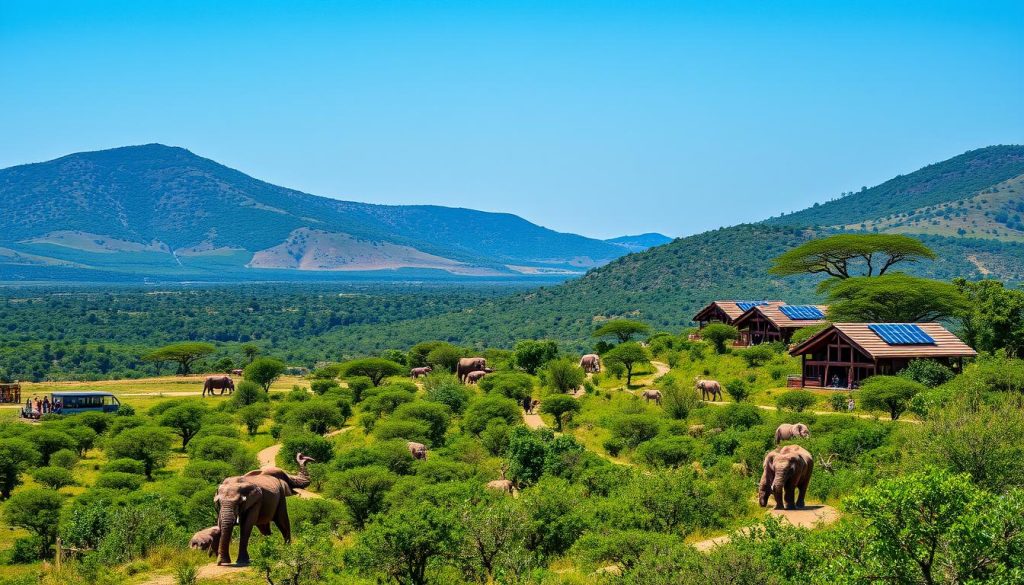
Eco-tourism is growing fast in Africa, offering a green way to travel. It helps protect wildlife while giving visitors a great experience. This way of traveling also supports conservation, which is key to keeping Africa’s nature rich.
In countries like Tanzania and Kenya, eco-tourism is thriving. They show how to travel lightly and connect with local people. Tourists get to see real culture and help the local economy.
- Community-based lodges use local materials and hire local guides, supporting green practices.
- Eco-tourism helps save endangered animals, improving their habitats.
- These tours teach people to love and respect African wildlife, promoting care for nature.
Africa is attracting more visitors who want to see its amazing wildlife. Eco-tourism is helping the continent towards a greener future. It’s a win-win for nature and communities alike.
Investing in Green Technologies
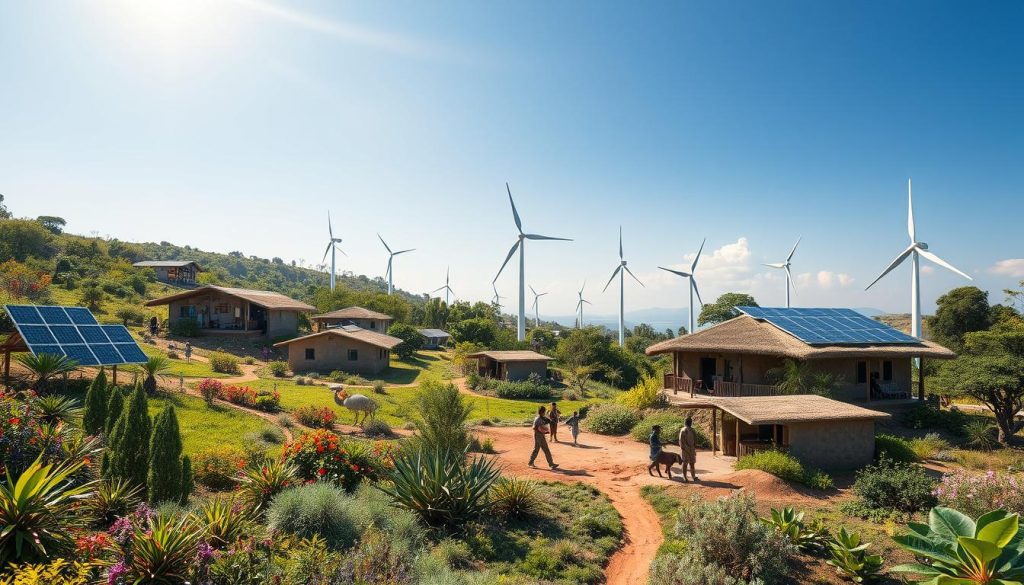
The world of green technology investments in Africa is growing fast. This offers great chances for entrepreneurs and investors. Clean tech startups lead the way, creating new solutions for big environmental problems. They help grow the economy and protect our planet.
Clean Technology Startups
Clean tech startups are key to green technology’s growth. They use tech to make products and services that are good for the environment. Their work includes:
- Renewable energy solutions that cut down on fossil fuel use
- Waste management tech that boosts recycling
- Water purification systems for cleaner water
Investments in clean tech from both public and private sectors are crucial. With the right support, these startups can grow and help solve big environmental issues.
Research and Development Grants
Getting R&D grants is important for green tech innovation. Governments and private groups offer money to help research. These grants help startups:
- Do research to create new tech
- Test their solutions in real life
- Grow their teams with experts
This support is key for making clean tech solutions work. With R&D grants, startups help create a greener future. They also attract more investments, keeping the cycle of innovation going.
Water Conservation Projects
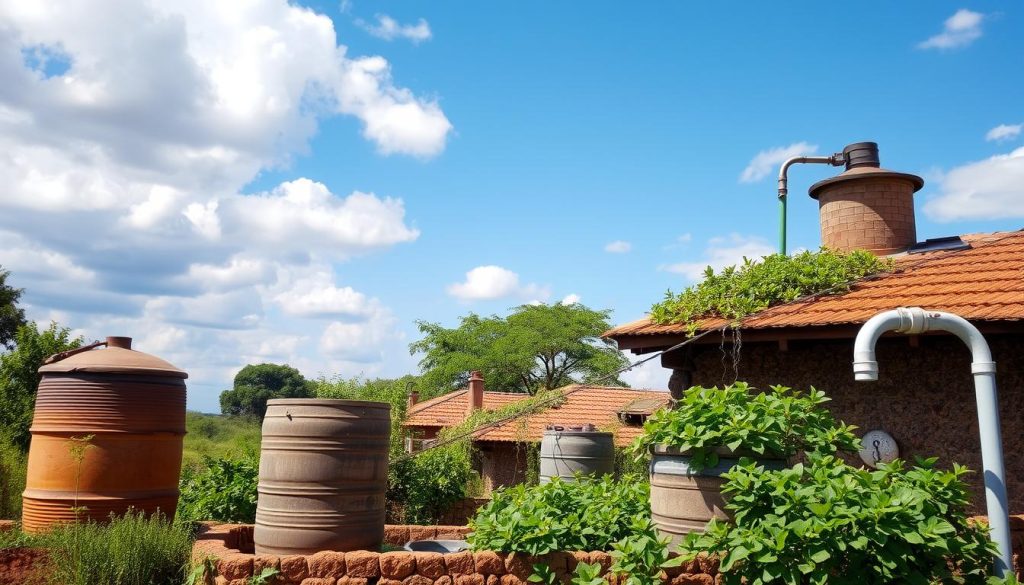
Water conservation is key in Africa, where water is scarce. Climate change makes it even harder to manage water. Rainwater harvesting is a top way to save water in dry areas.
This method helps keep water safe and teaches us to use it wisely. It’s a big step towards a better water future.
Rainwater Harvesting Techniques
Rainwater harvesting means catching and storing rainwater. It’s done from rooftops and other places that catch rain. This method works well in many countries.
- Ethiopia: Big tanks store rainwater for rural areas, making clean water more available.
- Namibia: Rooftop systems give homes a steady water supply for homes and farms.
Studies show rainwater harvesting is very effective. It boosts local water levels, cuts down on old water sources, and helps nature. It makes communities stronger against climate change and supports green water use.
Community-driven Eco-friendly Businesses
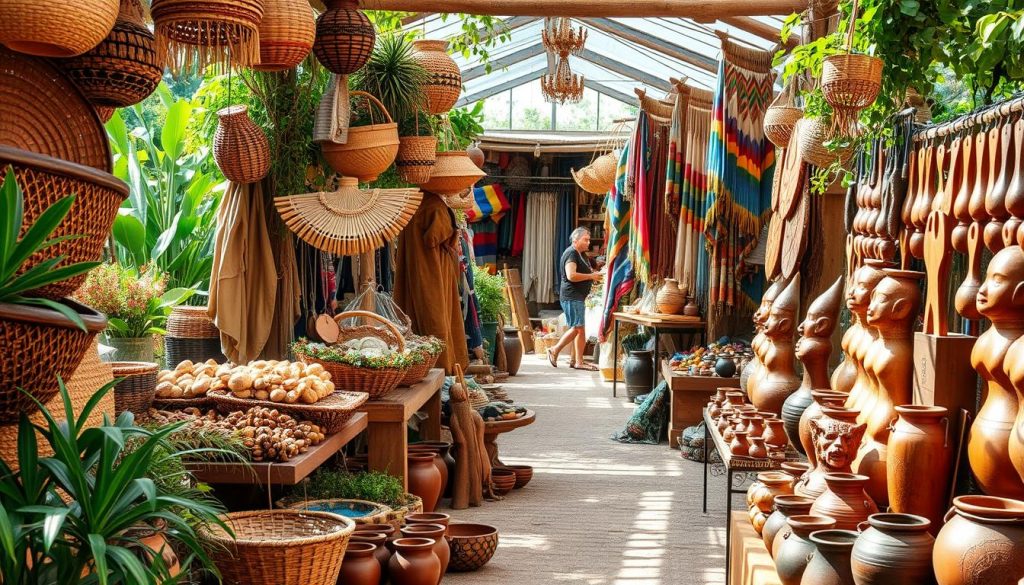
Community-driven eco-friendly businesses are key in promoting sustainable practices. They support the local economy by focusing on artisan products and local crafts. These efforts preserve traditional skills and strengthen community identity.
By working with global markets and organisations, artisans can reach more customers. This helps improve their livelihoods.
Local Craft and Artisan Products
The rise of local crafts shows the value of preserving cultural heritage. Artisan products made from sustainable materials tell the stories of their creators. These can include hand-woven textiles and pottery, showing the artisans’ bond with nature.
- Promotion of local crafts encourages community engagement and pride.
- Artisan products enhance the perception of unique cultural experiences for consumers.
- Community businesses foster economic growth by creating jobs and attracting tourism.
Case studies show successful partnerships between local artisans and international organisations. These partnerships help artisans grow and provide them with training and resources for sustainable development.
Eco-friendly Construction Practices
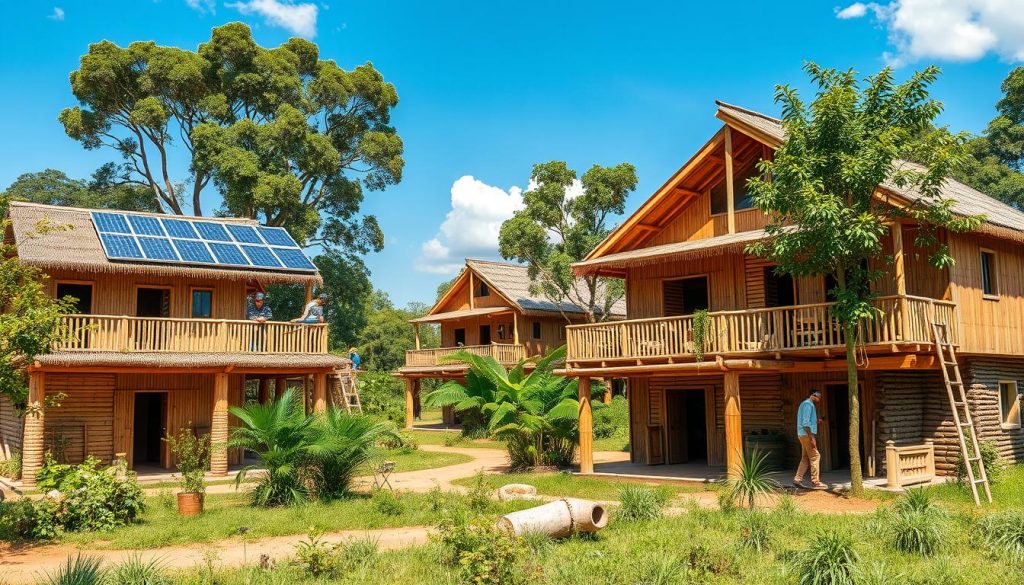
The trend of eco-friendly construction is growing in Africa, mirroring a global move towards sustainability. Developers use sustainable materials and energy-efficient designs to cut down environmental harm. Cities like Cape Town and Nairobi are leading the way with green building projects that meet international standards.
Utilising Sustainable Materials
Using sustainable materials is key in eco-friendly construction. These materials cut down carbon emissions and last longer. Some examples are:
- Recycled steel for structural frameworks
- Bamboo, known for its rapid growth and strength
- Cork and reclaimed wood for finishes
- Insulation made from recycled materials
These materials help create a circular economy and offer a strong alternative to traditional resources.
Energy-efficient Building Designs
Energy-efficient designs are vital to lower energy use in buildings. New architectural strategies include:
- Passive solar heating, which uses natural sunlight well
- Enhanced insulation to keep temperatures steady
- Green roofs or walls to improve air quality
- Smart technologies to cut down energy use
These designs not only save money but also make spaces more livable. Eco-friendly construction is a smart choice for new projects.
Government Support for Green Initiatives
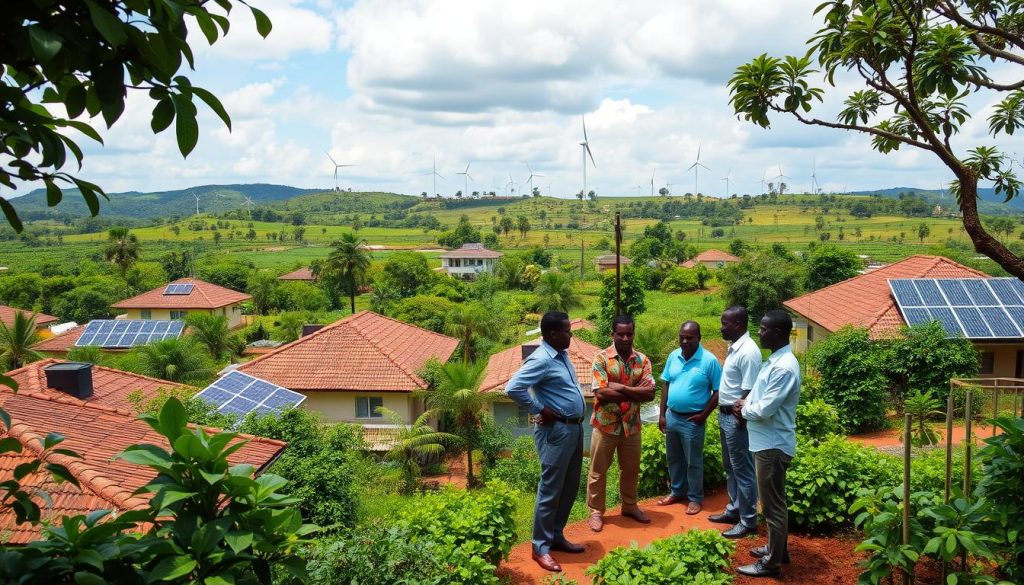
African countries are now seeing the need for green projects to fight climate change and support sustainable growth. Governments are key in this change, with many policies to help eco-friendly businesses grow. They focus on setting up rules that encourage green practices and offer benefits to those who care about the environment.
Many African governments are teaming up with global bodies to boost their green efforts. These partnerships bring more money, new technology, and training. They help local economies and support the goals of sustainability and protecting our planet.
- Creation of financial incentives, such as tax reductions for businesses implementing sustainable practices.
- Development of streamlined processes for permits needed by eco-friendly ventures.
- Investment in infrastructure to support renewable energy projects and waste management systems.
African governments’ dedication to green initiatives is vital in today’s world. Their actions now can lead to a greener future. This future will support economic growth and protect our environment across the continent.
Challenges Facing Eco-friendly Businesses in Africa
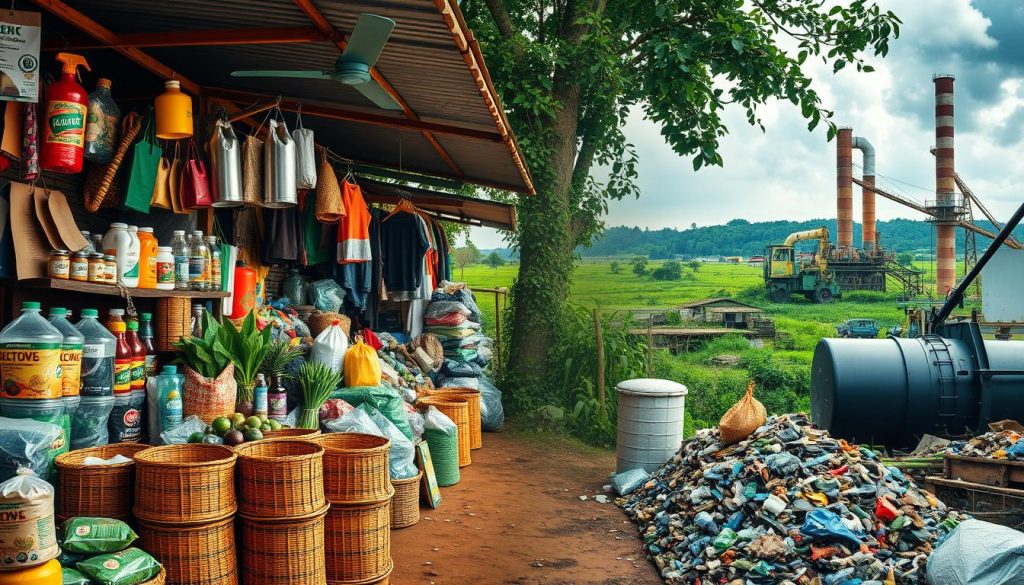
Eco-friendly businesses in Africa face big challenges. These include poor infrastructure, limited funding, and a lack of resources. These issues make it hard for these businesses to grow and succeed. It’s important to tackle these problems to help green initiatives in Africa.
Infrastructure Limitations
One big problem is the lack of good transport and utilities. This makes it tough to get sustainable materials and deliver products. For example, rural areas often have bad roads, leading to delays and higher costs.
To solve this, businesses could work with local governments. They could help improve the infrastructure needed for growth.
Access to Funding and Resources
Getting funding is hard for eco-friendly businesses. Banks often see them as risky. This makes it hard for entrepreneurs to get loans or grants to start or grow their businesses.
Also, finding quality materials can be a challenge. Businesses should look into crowdfunding and grants for green projects. This can help them get the money they need to succeed.
Case Studies of Successful Green Ventures
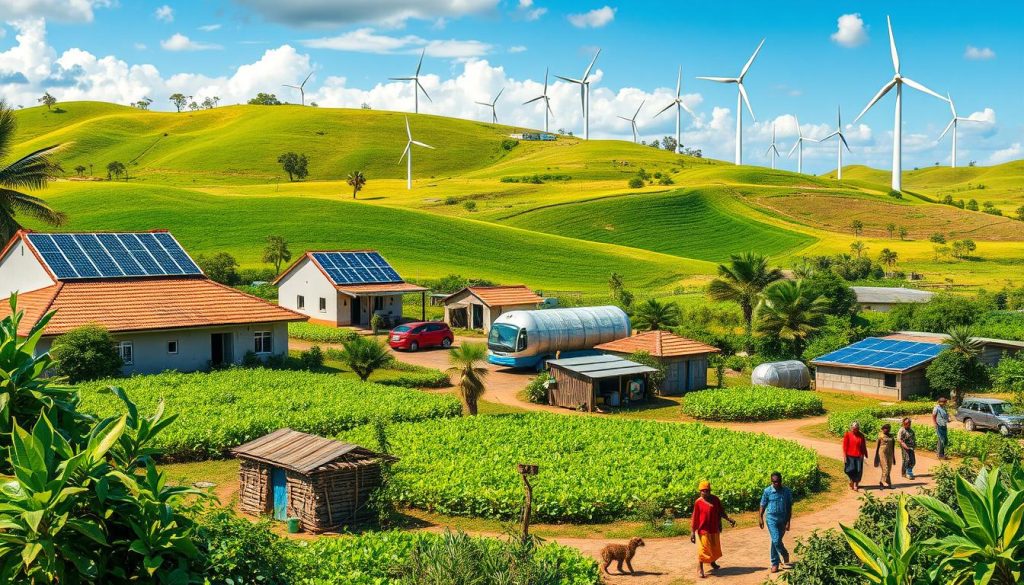
Looking into successful green ventures in Africa shows us the exciting world of eco-friendly business. Many entrepreneur stories share how they’ve made a difference. They’ve found creative ways to help their communities and the planet.
This part of the section focuses on a few of these stories. We’ll see what makes them stand out and the good changes they’ve brought about.
Local Entrepreneur Success Stories
Many entrepreneurs have shown us what’s possible with a focus on the environment. Their stories inspire us to take action. For example, a group in Ethiopia is growing organic coffee in a way that’s good for the planet.
They pay fair prices to farmers, helping the local economy. This also supports sustainable farming methods. It’s a win-win for everyone involved.
Impact Assessments of Green Ventures
Studies on green ventures show their big impact on communities and the environment. They highlight progress in reducing waste, using renewable energy, and farming sustainably. Let’s take a look at one example.
In South Africa, a solar power project cut down carbon emissions a lot. It also brought electricity to areas that didn’t have it before. This shows how green businesses can really make a difference.
Networking Opportunities in the Eco-friendly Sector
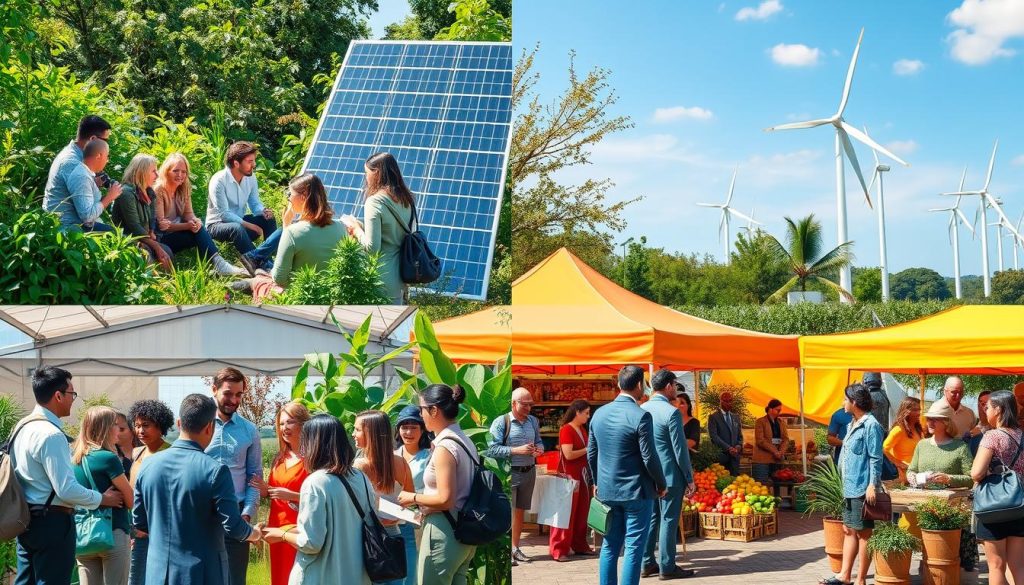
Networking is key in the eco-friendly sector. It helps businesses and entrepreneurs work together towards sustainability. Green business networks offer a place for people and companies to meet, share ideas, and work on green projects. This way, they can use each other’s strengths, learn from each other, and grow their market share.
There are many ways to network in this field. Sustainability conferences bring together leaders, innovators, and policymakers. They talk about environmental issues and how to solve them. Online groups, like LinkedIn, also help by keeping the conversation going and reaching more people.
Many entrepreneurs have seen the good side of joining green business networks. They often start new projects together that they couldn’t do alone. These partnerships not only help businesses do better but also help the planet.
In short, getting involved in networking in the eco-friendly sector is very beneficial. It helps sustainable businesses grow and succeed. Working together, they can do more to protect the environment.
Future Trends in Eco-friendly Business Opportunities in Africa
The future of eco-friendly business in Africa looks bright. Digital technology will be key in promoting sustainable projects. It will help companies use data to cut waste and improve efficiency.
People are now more aware of climate change and want sustainable products. This demand is growing in areas like renewable energy and organic farming. Young people in Africa are also looking for businesses that care about the environment.
Studies show green technology investments will rise. Clean energy and waste management will grow a lot. Businesses that focus on sustainability will thrive in Africa’s expanding eco-friendly market.

